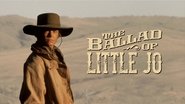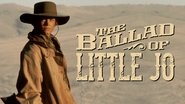Andy (film-critic)
To say that there is nothing positive about "The Ballad of Little Jo" may be a bit harsh – so, in reality – there is ABSOLUTELY nothing positive about "The Ballad of Little Jo". Some will argue that Suzy Amis "delivers an outstanding performance as a woman passing as a man", but this viewer found it unbelievable and chaotic. Why was a scar needed to disguise her face? Why didn't the photographer take her back? What caused Josephine's father to react the way that he did? In a barrage of flashbacks, we get this feeble story of how Jo came to the decision to transform her image. Opening the door to the most incomplete scenes of the film, director Maggie Greenwald treaded lightly, giving us mere glimpses of her past instead of what should have been nightmarish remembrances. The sound of her father's angry voice should have been repeated throughout the film, giving us a sense that Jo struggled with this throughout her life – but instead – they faded in an out continuously, giving us only short times to remember the truth before it was forgotten again. The largest complaint with all the characters is that none of them push the question of "why?" Why did Jo leave her child? Why didn't she just stay in a nearby neighborhood back east? Why did she happen to "friend" nearly every person that she met? Why didn't Jo have any enemies? Where was the conflict among the characters, and to say that she had conflict with Ian McKellen's character or Bo Hopkins, would be rubbish. She lived, like this film, randomly and transformed this film from pushing the sexual envelope to merely a documentary. "The Ballad of Little Jo" had no message, simply demonstrating to us that if you wanted to escape, fool those who cared, and forget about the past – it was possible.Suzy Amis was a major contributor to the downfall of the film, but the same blame can be placed on Mr. McKellen who left us more confused and bewildered with each tangent step. Why did Jo befriend him? What was his dark secret? While he was essential to Jo understanding the ways of "man", he seemed more like filler than influence. With no understanding of his motives, we are left with simply a shell of a character. That could be said for everyone – shells with no life. As we come full circle, another finger could be pointed at director Maggie Greenwald. What was her purpose with this film? Was it to critique gender roles throughout history or strike a chord with women's rights? The message, like this film, is unclear. She balanced uneven narratives with panoramic widescreen shots of the open land. In one instance she introduced a new family to the characters, a group of foreign settlers staking their claim, and instead of developing a bond between Jo and these less influential characters, we are left with just a handful of moments that lead to an non-climactic moment. Forced tears are constantly a staple of Greenwald's shots, but those man-made rivers go nowhere. Tears were shed for this family, but without purpose the audience feels cheated and misplaced. Greenwald is your average director, never quite reaching her full potential, while never slipping below the "I learned this in Directing 101" line.Sloppy acting coupled with sloppy direction, my critique of there being nothing positive to say about this film stays firmly in place. As I recall moments of this film, with the direction and acting firmly traveling a corrupt path, the two subsequently hurt the tone and pacing of the film. Greenwald took liberties in the simplicity it was to transform one's self into a man. Jo seemed to accomplish this feat in a mere matter of hours, and with no acting, was easily able to slip into the role. This leads us to the ending, which (without giving any parts away), is a disaster because we work ourselves up for two hours, questioning Jo's every move that may consequently stumble upon the truth, only to get our wind let out as nothing happens to bring Jo full circle. Realism? One could argue that this was simply a ploy to end a train-wreck of a film, but with Greenwald behind the camera, anything is possible. This was a waste of two hours, not even those hoping to say, "…sexual questioning was alive during the settlements", would be fooled by this one. It is a cheap biography that fails to give us an accurate depiction of a brave heroine.Overall, if you haven't already guessed it, I cannot support this film with any part of my body. My heart hoped this would have been a darker film with more attention spent on the horror of man towards women, or at least a film about the struggling voice of a woman, but instead it was a shady film about one woman's ability to cower away from responsibility (she should have fought for her son) and trick everyone around her. It was neither a sad film nor a persuasive film, as the moments of emotion were forced by Greenwald's camera and desire to build a "pretty" frame. The characters suffered from missing souls, and the question of "why" suffered from not being asked enough. Amis, Hopkins, and McKellen were atrocious in their respective roles as they never quite understood the period they resided. "Ballad of Little Jo" was missing important elements like style, themes, reality, and cohesiveness. While I was hoping it wouldn't be another "Brokeback Mountain", I was at least hoping for purpose, reason, or point, but found nothing but the truth that women could easily hide from men if randomly excommunicated from their families. This was an embarrassment of a film, and a disappointment for those hoping for a clear, concise message about sexuality. Skip this one – unless you like unbiased, unchallenging biographies.Grade: * out of *****
ccthemovieman-1
I found this to be one of those "haunting" films that has stayed with me. Suzy Amis' performance has stuck with me since I first saw this movie in 1994.As for the story, yes it's hard to believe that no one would notice a "man" who never had any facial hair, whose voice was fairly high and had such narrow shoulders but despite the unrealistic premise, it's a good story that keeps your attention all the way without the need for action (although there is some.) Amis does transform her looks from a fairly pretty woman to someone that looks like a frail 17-year-old boy. David Chung, who plays her Asian friend (well, more than that) also is very good and Bo Hopkins also has a strong contribution as the neighbor.But this movie belongs to Amis all the way and just the painful looks on her face alone are memorable enough for me. What a haunting, sad look! Thus, it is not a happy story, but it's powerful one and worth seeing. Worth hearing, too, with some nice guitar work for the soundtrack.If you are looking for a western that has a different angle, this certainly qualifies.
Mac MacLaren
I'm sure that is *is* possible for a woman to pass as a man - given a masculine enough face and mannerisms, but... I can't help thinking that this movie would have been better starring a man as a woman pretending to be a man. At least then the viewers wouldn't have had to suspend their belief for two hours while the 'awful' truth unfolded in front of dozens of men who couldn't tell the difference 'twixt girl and boy. Suzi's acting is good, but the others don't really contribute much; they seem unimpressed with the plot... and I have to admit, there wasn't much of one. The detail and the stark reality of the period are well captured, though; the cold, the rain, the emptiness and loneliness of the hills and the stark wild west; the barbarity, stupidity and selfish race and sex discrimination were well portrayed in the direction and dialogue.
Outi
I've been waiting to see this film ever since it premiered in 1993, but only a couple of days ago I finally got a chance to see it on TV. It was well worth the wait, although I would have loved to have seen it on big screen instead. First of all, Suzy Amis who I think has repeatedly been miscast and generally far too unappreciated as an actress does a brilliant, intuitive job in the lead role. Her transformation from Josephine to Jo is touching and believable, and her performance all through the film maintains the very same characteristics. She avoids the trap of being a mere male imitation and instead builds her own tough concept of what constitutes a true man of honor living in the middle of the rough wilderness. Director Greenwald lets her story flow beautifully in its own calm pace; she makes Jo's expressive face the very core of this remarkable film - that's where all starts and, finally, ends. Film's gorgeous landscapes and panorama may take your breath away as well, but it's really the director's ability to understand Jo Monaghan's incredible life story that makes The Ballad of Little Jo such a magnificent experience.




